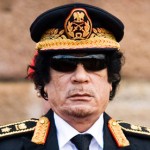Lobbyists Cashed in on Qaddafi
 In an important piece today, David Corn looks more closely at Qaddafi's Western enablers. Guess what? They weren't working for free.
In an important piece today, David Corn looks more closely at Qaddafi's Western enablers. Guess what? They weren't working for free.
David Corn has more today on Qaddafi's Western enablers.
And guess what? They weren't working for free. Libya hired Monitor group, a Boston-based consulting firm, to woo US and UK opinion formers.
In 2006 and 2007, Benjamin Barber, an author specializing in democracy studies and a senior fellow at Demos, a pro-democracy think tank, took three trips to Libya as a paid consultant to Monitor. On these visits, Barber met with Libyan lawyers, officials, and activists interested in democratic reform—and Qaddafi, too. "We went," he says, "in the hope we might be able to reinforce elements inside Libya interested in change, looking to engage civil society and create a foundation for a movement." Barber served on the international advisory board of Qaddafi International Charity and Development Foundation, which was overseen by Saif Qaddafi, the second-eldest son of the Libyan dictator, who supported the foundation's work on human rights and democracy-promotion projects and who seemed a reformist himself (until last month, when he sided with his father in declaring war on the protesters). "Did I realize that I was working within an autocratic regime and the odds of making change were low?" Barber remarks. "Yes."
Barber says he believed that the main aim of the Monitor Group's Libya project was to stir reform there—trying to "turn Libya from a rogue state into a better state." He was encouraged by small steps he saw in the country. And in August 2007, Barber wrote an op-ed for The Washington Post, noting that Libya had finally released five Bulgarian nurses and a Palestinian doctor who each had been condemned to death for allegedly infecting children in a Libyan hospital with HIV. In the article—headlined "Gaddafi's Libya: An Ally for America?"—Barber wrote that his one-on-one conversations with Qaddafi had convinced him that the Libyan leader had arranged for their release to show his desire for "a genuine rapprochement with the United States."
"Libya," Barber noted, "under Gaddafi has embarked on a journey that could make it the first Arab state to transition peacefully and without overt Western intervention to a stable, non-autocratic government." He reported that Qaddafi, whom the United States and other governments had identified as a possible ally in the war against Al Qaeda, had been "holding open conversations" with Western intellectuals.
But Barber did not mention in the Post piece that he himself had been a paid consultant for the Monitor Group. Was this an oversight? "I don't think so," Barber says, adding that he assumed he was on the payroll to help Monitor promote reform in Libya, not sell Qaddafi in the United States. (According to a blog post he wrote for the Huffington Post on February 22, Barber and all the members of the international advisory board of the Qaddafi Foundation resigned in response to the Qaddafi's regime's violent reaction to the uprising in Libya.)
One comment on Corn's piece. I do think a distinction has to be drawn between those - like Barber - who took Libyan money and those - Corn mentions Richard Perle and Bernard Lewis - who traveled to Libya to meet and assess Qaddafi's intentions. Qaddafi in the mid-2000s was making noises about changing the orientation of his foreign policy. Accepting an invitation to come listen and judge the sincerity of those noises is exactly the kind of service that we ought to expect people interested in foreign policy to perform. (Didn't people like Corn used to criticize people like Perle for not listening enough?) The red line is the acceptance of money - not the acceptance of a plane ticket and an invitation to a conversation.
Tweet